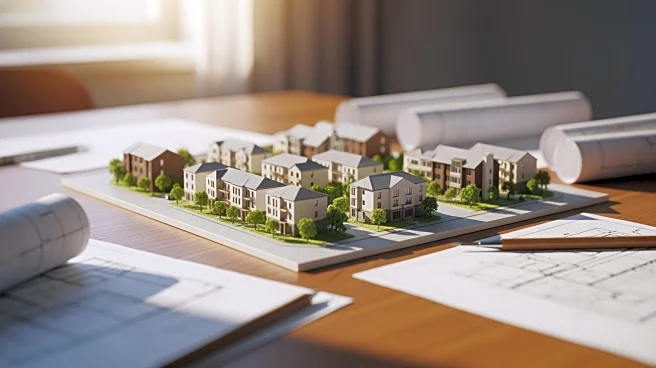What's Happening?
Meritage Homes has purchased the former headquarters of the Trinity Broadcasting Network in Costa Mesa for $44.5 million. The acquisition follows city approval of Meritage's plan to develop 122 townhouses and 20 single-family homes on the site. The property, known for its ornate palazzo-style architecture, was previously owned by Khoshbin Co., which used it as an event venue. The site, dating back to 1978, was sold by Trinity in 2017 after being deemed obsolete. The redevelopment is expected to take about two years, with Meritage planning to provide housing for the 'missing middle'—those looking to transition from renting to owning.
Why It's Important?
The redevelopment of the former Trinity Broadcasting site addresses the high demand for housing in Costa Mesa,
where 60% of residents are renters. By offering townhouses, Meritage Homes aims to provide affordable options for individuals seeking to build equity and eventually move up the housing ladder. This development is significant in a coastal city facing rising housing costs, and it includes seven units designated for very low-income occupants. The project reflects broader trends in urban development, where repurposing obsolete properties for housing can help alleviate shortages and support community growth.
What's Next?
Meritage Homes will proceed with the demolition of the existing structure to make way for the new housing development. The project is expected to take approximately two years to complete. As the development progresses, local stakeholders, including city officials and residents, will likely monitor its impact on housing availability and affordability. The initiative may also prompt further discussions on urban planning and housing policies in Costa Mesa and similar communities facing housing challenges.
Beyond the Headlines
The transformation of the Trinity Broadcasting site into residential housing highlights the evolving landscape of real estate development, where historical and iconic properties are repurposed to meet modern needs. This shift raises questions about preserving cultural heritage versus addressing practical demands for housing. Additionally, the project underscores the importance of creating inclusive housing solutions that cater to diverse economic segments, potentially influencing future urban planning strategies.

















